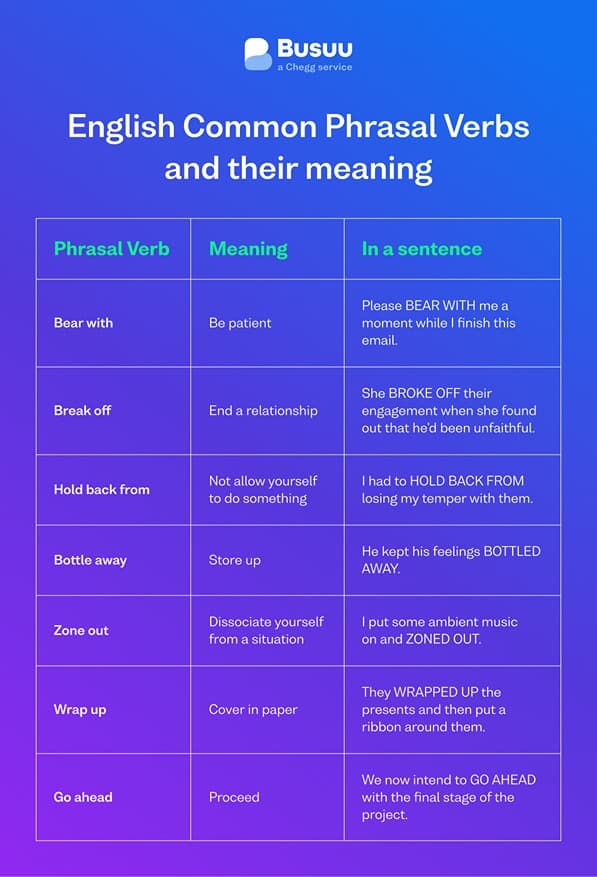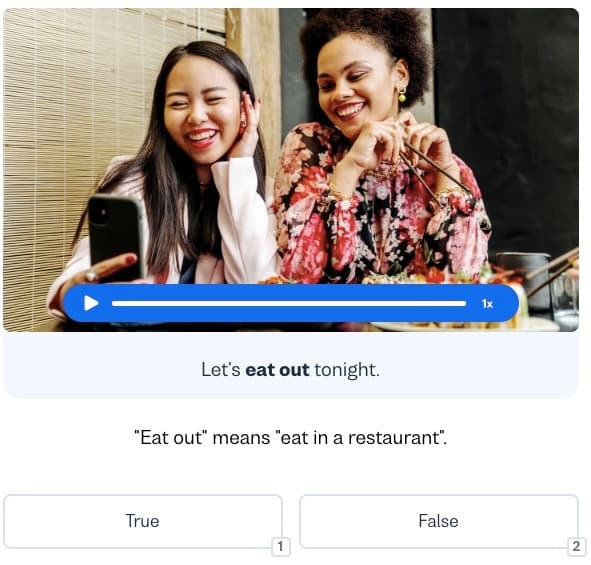I want to learn...
At some point in your journey in learning English, you’re going to encounter phrasal verbs. In this guide, we’ll cover what they are, how to use them and give you some common examples you can put into practice.
What are phrasal verbs?
Phrasal verbs are two or more words that come together to give us a new verb with a different meaning from the original words. To understand better, let's have a look at some examples of phrasal verbs: put on means to place on something on yourself (like clothes), get on means to progress, and move on means to go forward even if you must leave something behind.
Phrasal verbs are highly useful for informal conversations. But if we are not aware of the meaning of these phrasal verbs, we might face difficulties in understanding informal English. So, for a fluent and natural conversation, understanding phrasal verbs helps a lot!
So, let’s learn more about them!
How to use phrasal verbs in different sentences
Here is an interesting fact about phrasal verbs. We just need to conjugate the verb part of the phrase, and the other words remain unchanged. For example:
When we eat at a restaurant, I eat up all my salad.
I ate up all the pie on my plate.
In the above sentences, only the word eat changed. The word up remained unchanged.
Also notice that eat is an irregular verb, so its past tense is irregular in the phrasal verb, too (ate).
As you can see, we can use phrasal verbs to make our conversations easier and more natural. While learning about phrasal verbs, we also need to understand the importance of conjugation, which maintains verb tense consistency.
Now that we know what phrasal verbs are, let’s look at types of phrasal verbs.
What are the types of phrasal verbs?
The main types of phrasal verbs are as follows:
Separable phrasal verbs
Inseparable phrasal verbs
Transitive and intransitive are simply terms that apply to all verbs depending on whether an action is transferred to an object (transitive) or not (intransitive), so let’s focus on separable and inseparable phrasal verbs.
Separable phrasal verbs
Separable phrasal verbs are separable because they can be separated by the object (i.e. the object can come between the words that make up the verb).
Although words may come between the two parts of the phrasal verb, the two parts should not be switched in order. For example, in the examples below, holding comes before against and hand comes before over.
Example:
For a long time, I was the one who had been holding all the anger against you.
Manish was waiting for his application form. If you don’t mind, can you please hand it over to him?
Inseparable phrasal verbs
Unlike separable phrasal verbs, these particular phrases can never be separated from each other no matter what. They are meant to be together, always.
Example:
The burglars broke into the car.
I need to do away with my past to get my things right.
Now that you know about phrasal verbs and have learned about their types, identifying these types of verbs in a sentence is easy.
There are many examples of phrasal verbs in English.
Let’s see some examples of phrasal verbs that are commonly used in the English language in the list below.
Common phrasal verb examples and their meanings

1. Bear with
Be patient.
Please BEAR WITH me a moment while I finish this email.
2. Break off
End a relationship.
She BROKE OFF their engagement when she found out that he'd been unfaithful.
3. Hold back from
Not allow yourself to do something.
I had to HOLD BACK FROM losing my temper with them.
4. Bottle away
Store up.
He kept his feelings BOTTLED AWAY.
5. Zone out
Dissociate yourself from a situation.
I put some ambient music on and ZONED OUT.
6. Wrap up
Cover in paper.
They WRAPPED UP the presents and then put a ribbon around them.
7. Go ahead
Proceed.
We now intend to GO AHEAD with the final stage of the project.
8. Pick out
Choose.
She PICKED OUT the foods she wanted to take and left the rest.
9. Prey upon
Exploit or harm.
They PREY UPON people's fears in order to get them to buy products.
10. Look up
To get better.
Everything is finally LOOKING UP for Lucy.
11. Come out
Make your sexual or gender identity known to others.
She CAME OUT while she was at college and has been living with her partner, Jane, for the last couple of years.
12. Get away
Escape
She went on vacation in the country in order to GET AWAY from the city for a while.
13. Jerk around
Behave stupidly.
The rude students were JERKING AROUND during the lecture.
14. Kill off
Reduce or exterminate a population by hunting, pollution, development, etc.
There used to be a lot of wolves around here, but most of them have been KILLED OFF by humans.
15. Pair off
Begin a romantic relationship.
They PAIRED OFF shortly after starting university.
16. Pass out
Distribute.
The protesters PASSED OUT leaflets to the growing crowd.
17. Pile in
Enter a place quickly, in a disorganized way.
We all PILED IN the bus to go to the concert.
18. Strike down
Make someone ill.
I was STRUCK DOWN with food poisoning.
19. Track down
Find after a long search.
It took me ages to TRACK my friends DOWN in the crowd at the football game.
20. Train up
Teach someone the specific skills they will need to carry out a job or task (this is a British example).
I have been TRAINING my new assistant UP.
21. Walk up
Go to someone.
A man WALKED UP and asked me the time.
22. Double as
Have a second function or purpose.
My study DOUBLES AS a spare bedroom when we have visitors.
23. Dob in
To report someone’s wrongdoing (this is a British usage).
He DOBBED us IN as soon as he found out.
24. Cut off
Isolate or make inaccessible.
The heavy snow has blocked many roads and CUT OFF a number of villages.
25. Pass for
Be accepted as something that it is not.
You'd be surprised at what PASSES FOR good cooking in many restaurants.
26. Run over
Exceed a time limit.
The meeting RAN OVER by twenty minutes.
27. Go down
Reach or go as far as.
This path GOES DOWN to the lake.
28. Hand back
Return something.
The police officer checked my license and then HANDED it BACK.
We hope that this article helped you in understanding phrasal verbs and their types. The understanding of phrasal verbs is one of the basic skills that is required
to speak like a native speaker in English.
Newlanguages

